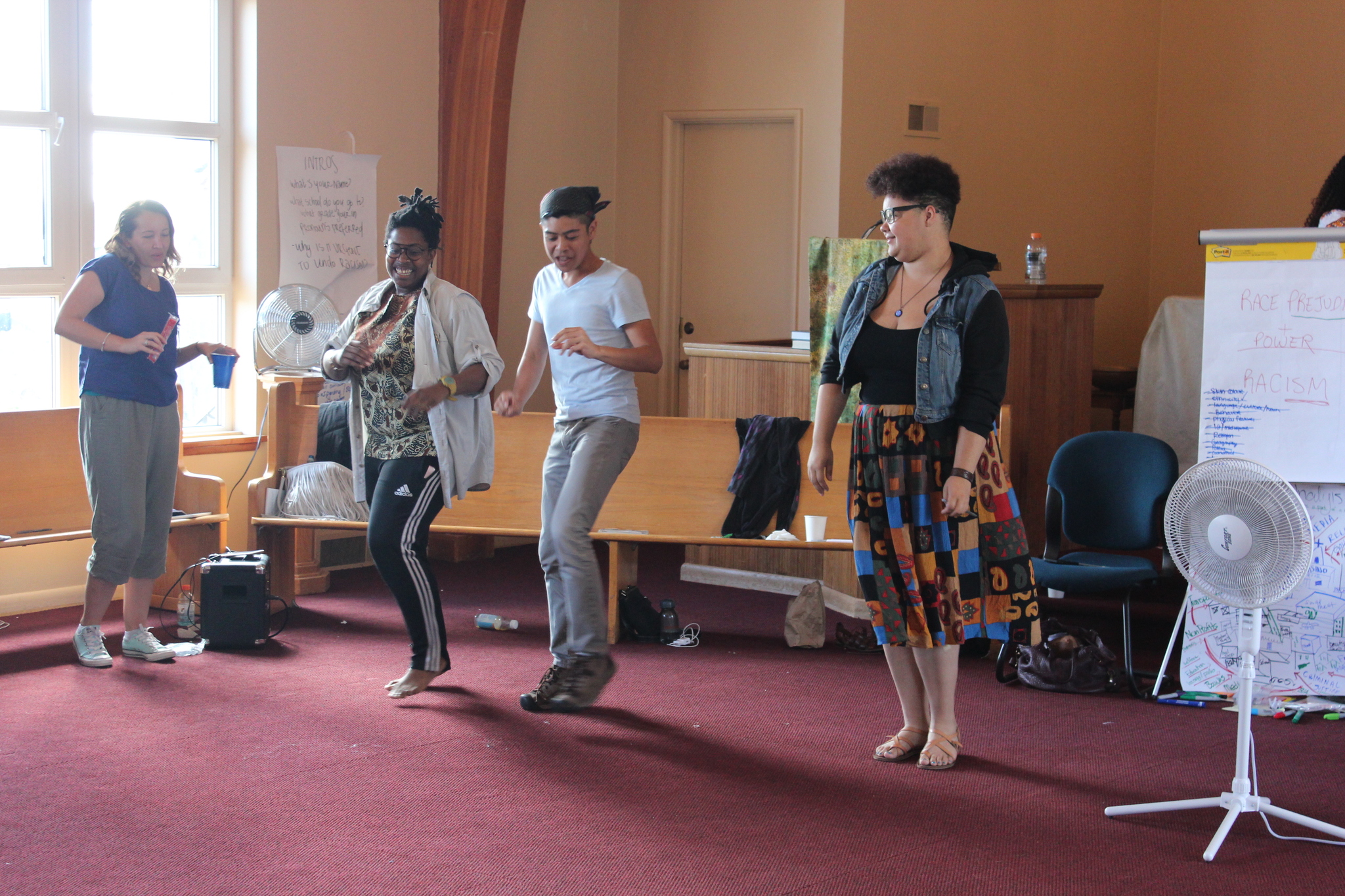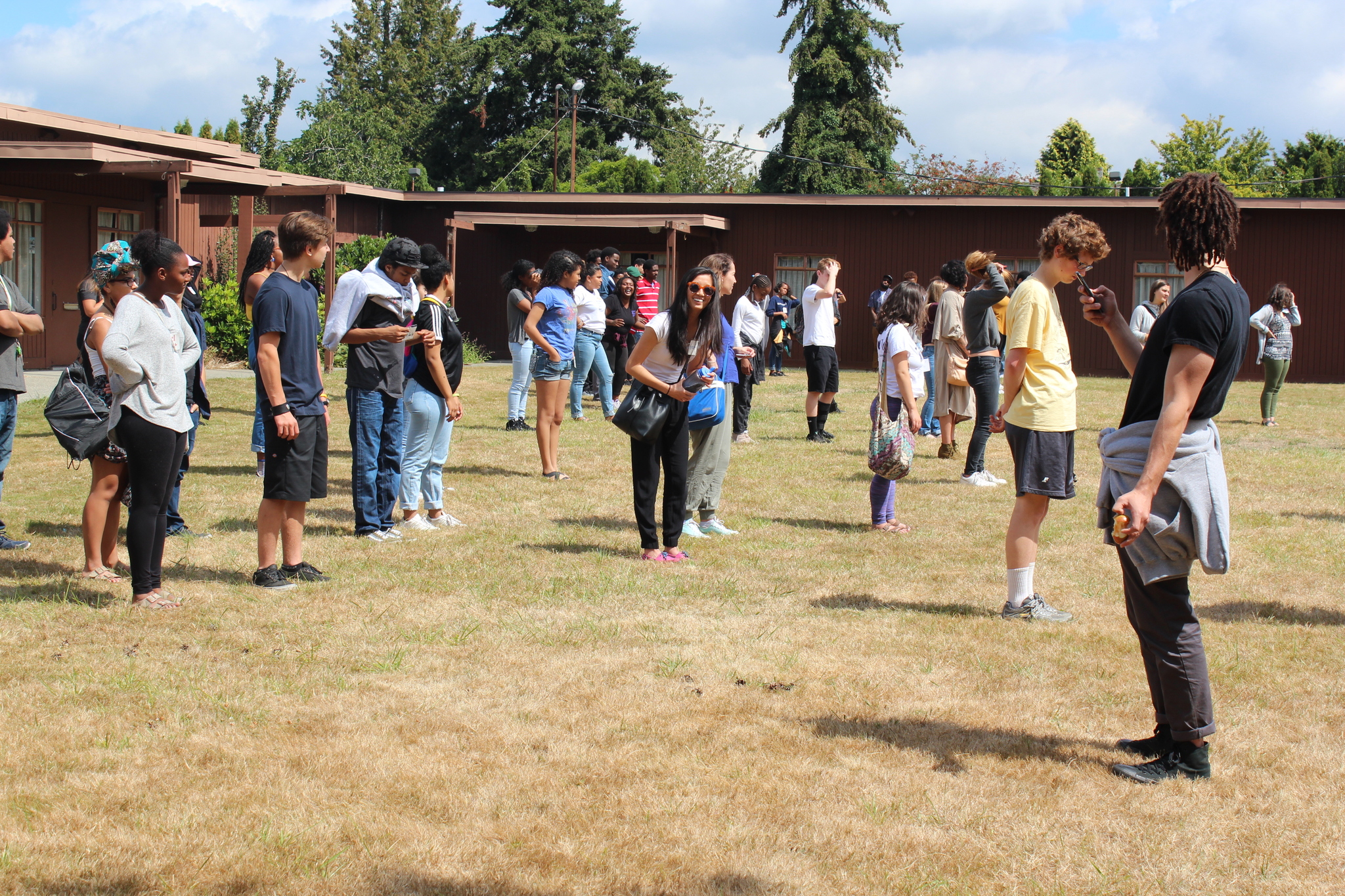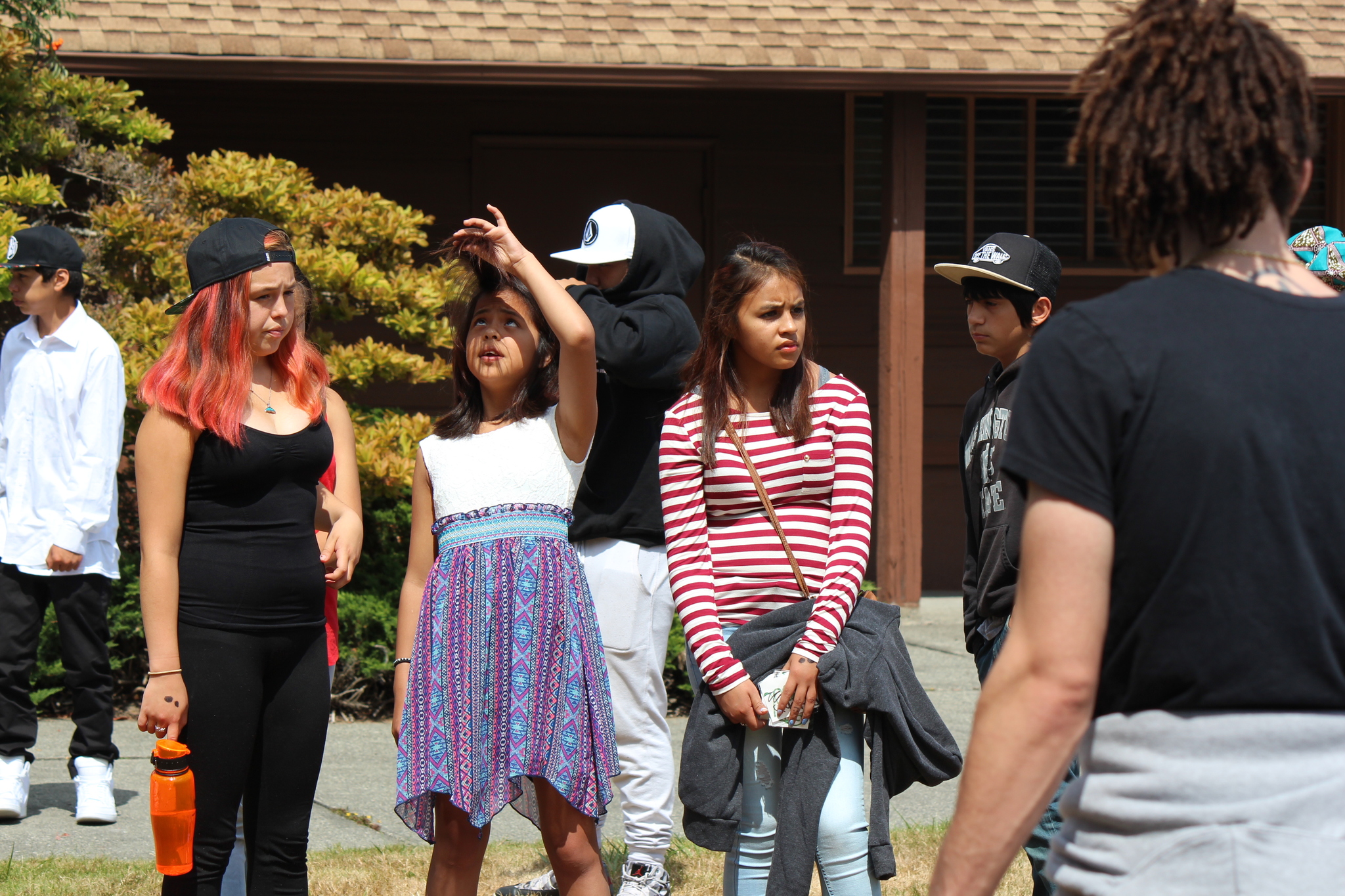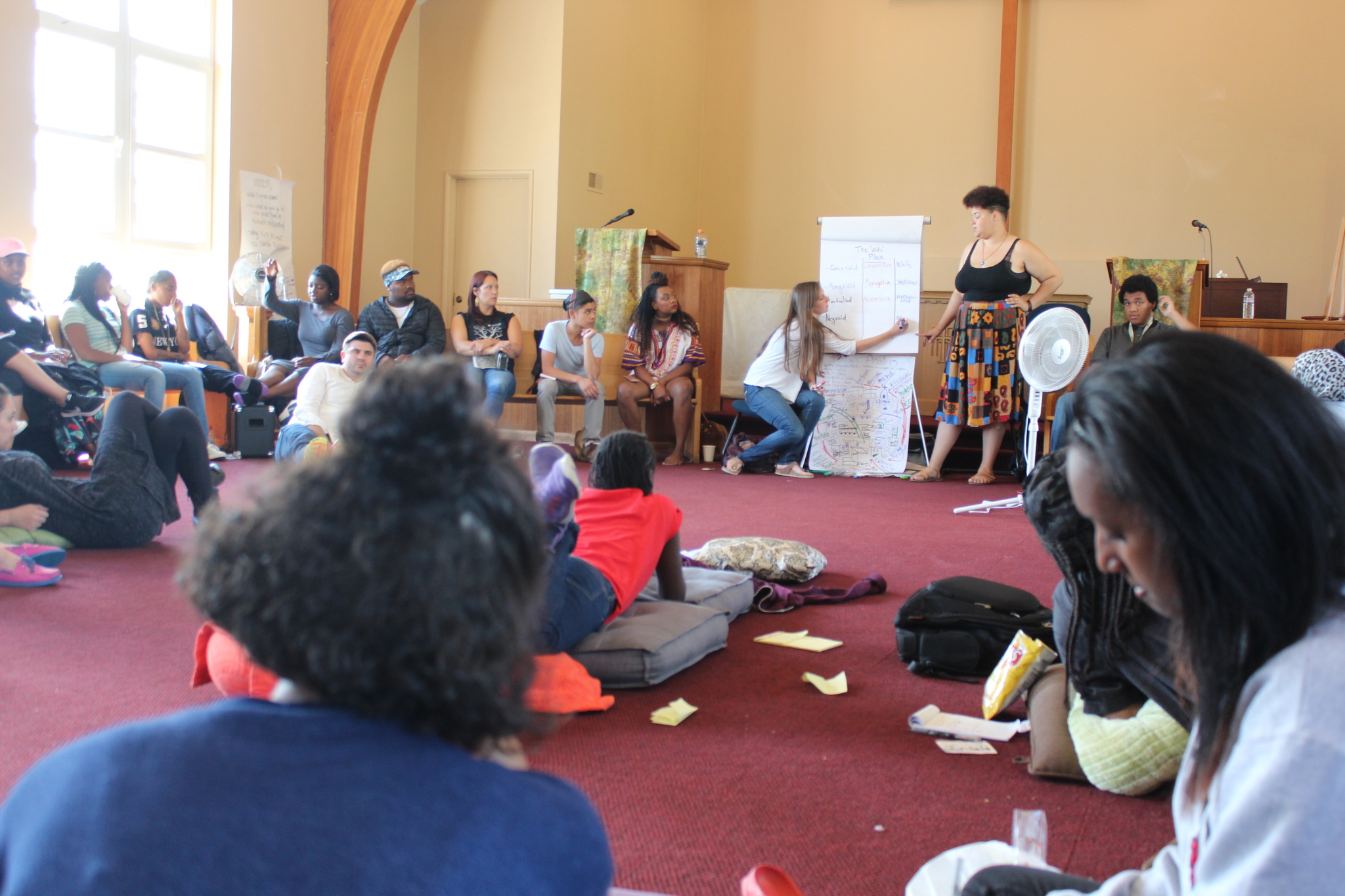About 100 young people in their teens and early 20s are standing on the sunburned grass in a straight line, elbow to elbow, hip to hip.
“If you were ever called names because of race, class, ethnicity, gender, or sexual orientation… take a step back!” Three facilitators – also young – are taking turns shouting directions, detailing experiences that many in line know well. At this, the first cue, almost everyone obeys.
“If you’ve ever changed your behavior or appearance to avoid being ridiculed for your race, class, ethnicity, gender, or sexual orientation, take a step back.”
“If your family ever had to move because they could not afford the rent, take a step back.”
“If you were generally able to avoid dangerous and unsafe situations, take a step forward.”
“If you were raised in a single-parent household, take a step back.”
The directives continue, inexorable. Eventually, someone calls out, in defense of his friends, “Hey, they can’t take a step back anymore. They’re in the bushes.”
The exercise lasts about half an hour. At the end, the stratification is clear, burning, and rigid as iron: As a rule, it is the kids with the darkest skin whose backs are against the bushes; those with the lightest skin are approaching the sidewalk.
“This is the actual graph of privilege,” explains co-facilitator Asha Heru. “You’re on a graph of privilege.” Heru is among many in attendance today who’ve been coming to, learning from, and teaching at Seattle’s Tyree Scott Freedom School for several years now, and who see the biannual youth-focused workshop (held this year August 9 through 12) as a key component in anti-racist organizing. The graph-of-privilege exercise is always part of it. “It’s definitely a reality check, getting real with, like, where you actually sit in this country and what you actually have access to and what people legitimately don’t have access to,” she says. “It’s wild to think about… sometimes it’s hard to swallow.”
The group’s discussion afterward – in the warm, packed atrium of the Bethany United Church of Christ, on Beacon Avenue South – is raw, emotional, bewildered, and, at times, angry.
“I hate this activity. It makes me pissed,” says a woman in a headscarf.
Another points to the shock of “really getting a visual for that extreme gap in between people.”
“For me, it was really weird. I was in the back, but I had never seen myself as less privileged. I just thought everybody experienced the same thing,” she says.
The fact that everybody does not experience the same thing – not in school, not in the criminal justice system, not in the job market – is central to the discussion, which moves from the idea of privilege and disparity to an active deconstruction of the very concept of race (and re-construction of new, working definitions of “racism” and “racist”). Facilitators note, for instance, that a major foundational concept of “race” as we know it today was created, whole cloth, by the late-1700s German researcher Johann Friedrich Blumenbach, who introduced the term “Caucasian” as synonymous with white and believed in its superiority.
“We’re getting a lot of the backstory on establishments and things, and systems, that haven’t really been told before, or taught in school,” says first-time participant AJ Oguara, a multiracial recent high school graduate (he is an enrolled member of the Colville tribe, through his mother and grandmother; his father is from Nembe, Nigeria). “It’s willing to go into the ugliness of history. I feel like I’m really learning. Stuff I get here… it’s stuff I will remember forever, really.”
For those participants who will be starting school next week the Freedom School provides a stark counterpoint to what’s taught in traditional classrooms.
“The system [in the U.S.] is really set up for one group of people,” Oguara says. “Schools should really go into that.”
The first Freedom Schools were launched during the Civil Rights Movement – both as an act of protest and an effort to provide a more equitable education to African American children. The most well-known were those established in Mississippi during the summer of 1964, but similar efforts were staged across the country, including Seattle. In 1966, about 3,000 African American students poured out of Seattle Public Schools into community spaces, a.k.a. “freedom schools,” as part of a two-day boycott designed to protest de facto segregation and inequality here.
Both of these were the “spiritual inspiration” for today’s Freedom Schools in Seattle, says Dustin Washington, community justice program director at American Friends Service Committee (AFSC) and co-founder of the first Seattle Freedom School in 2001. (It has since been renamed the Tyree Scott Freedom School, after a famed Seattle civil rights and labor activist who died in 2003). The curriculum draws heavily from Undoing Racism workshops created by the New Orleans-based nonprofit People’s Institute for Survival and Beyond. Over the years, Seattle’s Freedom School, held once in the summer and once in the winter, has morphed, evolved, and now expanded to other cities, including St. Louis, St. Paul, and Pittsburgh. It’s always free, and food is always provided.
Many attend repeatedly; Michaella Clemming, 20, has been coming to Freedom Schools in Seattle for six years.
“I still learn something every time,” she says. “That’s why I keep coming back.”
Many, like Asha Heru, have also become deeply involved with the workshop’s activist arm, Youth Undoing Institutional Racism (YUIR).
“We speak to [kids’] reality, to what’s happening in their communities on a day to day basis,” Washington says. “Young people are seeing the gross inequalities and inequities that exist in our society. They’re being overly incarcerated, racially profiled. They see their peers being disproportionately suspended in schools. They see the lack of affordable housing, of living wage jobs. We’re providing a context for why this is happening.”
Over the years, the workshop has hosted guest speakers from the Black Panther Party who’ve taken students on a historical tour of the Central District; students have also gone on field trips to the Wing Luke Museum, El Centro de la Raza, and the Tulalip reservation near Everett. Some Freedom Schools have culminated in panel discussions at City Hall, focused on, for instance, racial disparities in the criminal justice system. Both YUIR and another affiliated group, EPIC (Ending the Prison Industrial Complex), have made advocating against the Central District’s $210 million proposed youth detention center a priority – along with promoting alternatives to youth incarceration. This spring, the City Council passed a resolution earmarking $600,000 for such alternatives.
“I think one thing that differentiates” the Seattle Freedom School from other kinds of heady, academic race analysis work, says Washington, is “we put our information forward, our analysis forward, in the spirit of organizing. It’s not just an intellectual experience, per se.”
Heru calls it “building soldiers… Building people up so they can fight for what’s right.”
It’s late afternoon, and the air is thick with heat and emotion; some kids are sitting upright in their chairs, others are sprawled on their stomachs, chins in their hands. They’ve just collectively defined the term “racist” as “redneck” and “Donald Trump” and “the KKK.”
“Listen, we’re all gonna do an experiment,” says facilitator Justin Frietas. “Are you all with me still?”
“Yeeees.”
“OK, so tomorrow we’re gonna put them all in a spaceship,” he says. “All those mean, bigoted, hateful people are not here anymore. Here is the hundred thousand dollar question: Would this” – and he points to a poster the group had drawn earlier, with the words “power analysis” across the top in black marker, delineating injustices in health care, media, education, housing – “exist all over this country?”
“Yeeees.”
“It absolutely would,” he says, nodding, and his voice is softer now. “It wouldn’t miss a beat.” The lesson, here, is that racial problems in America run far deeper than simply a few outward bigots.
First-time attendee Nasarin Ahmed, 20, a Green River College graduate who’s transferring to the University of Washington this fall to study economics and education, says that she was introduced to many of the Freedom School concepts in the race and equity classes she’d taken in college. But before college, she says, “[I’d] never once talked about things like racism, or Islamophobia, or prejudice, or power in my schools. It took me until today to realize … I’ve never once had a black teacher. I never once had an educator that looked like me, that I could relate to. I’m starting to realize the importance of that.”
A lot of Freedom School students “have not done well with the mainstream, dominant-culture education system,” Washington says. “It makes you wonder what is breaking down in the schools. We believe part of that is because they’re not being taught the truth.”
That could, very slowly, be changing – at least in Washington state. Last spring, after a decade of advocacy, Tulalip state Sen. John McCoy convinced his fellow legislators to pass one of the few state laws in the nation mandating that Native history – the real Native history – be taught in public schools. And Freedom School facilitators have, on occasion, given some mini-workshops and presentations in public school classrooms.
But Washington doesn’t anticipate ever trying to re-create Freedom School inside traditional schools. “We believe it would be watered down and co-opted – even with the best intentions,” he says. “We think it’s healthier for it to be community-based.”
And that has a lot to do with the program’s radical roots. Instead of focusing on “fixing broken young people” who find themselves below a “so-called achievement gap,” he argues, we should be doing much more. “We should be fixing broken systems.”











